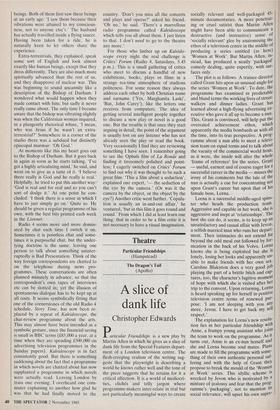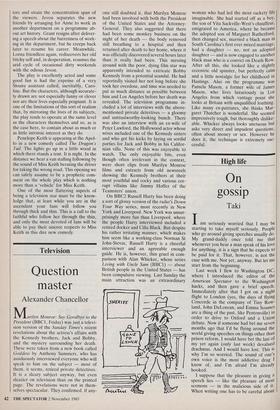Theatre
Particular Friendships (Hampstead) The Dragon's Tail (Apollo)
A slice of dank life
Christopher Edwards
Particular Friendships is a new play by Martin Allen in which he gives us a slice of dank life from the Special Features depart- ment of a London television centre. The flesh-creeping realism of the writing sug- gests that the playwright is describing a world he knows rather well and the tone of the piece suggests that he retains for it a critical affection. It is a world of mediocri- ties, clichés and telly jargon where programme-makers inter-relate in real but not particularly meaningful ways to create socially relevant and well-packaged 45- minute documentaries. A more penetrat- ing or cruel satirist than Martin Allen might have been able to communicate a destructive (and instructive) sense of `socially relevant' glee by anatomising the ethos of a television centre in the middle of producing a series entitled (as here) `Women at Work'. But Martin Allen, In- stead, stead, has produced a neatly 'packaged comedy dealing, quite expertly, with sur- faces only. The plot is as follows. A trainee director called Grant hits upon an unusual angle for the series 'Women at Work'. To date, the programme has examined in predictable and bland terms the working lives of street- walkers and dinner ladies. Grant has learned about a high-flying advertising ex- ecutive who gave it all up to become a nun• This, Grant is convinced, will help put the overrated achievement ethos, which apparently the media bombards us with all the time, into its true perspective. A prog- ramme about a nun able to meet a televi- sion team on equal terms and to talk about the vacuity of the commercial world from, as it were, the inside will alter the whole `frame of reference' for the series. Grant — useful, earnest and of course eager for a successful career in the media — misses the irony of his comments but the tale of the nun is actually a cue for concentrating not upon Grant's career but upon that of his female boss, Lorna.
Lorna is a successful middle-aged spins- ter who heads the production team. Aggressive and capable in her work, she is aggressive and inept at 'relationships'. The best she can do, it seems, is to keep up an unsatisfactory and casual affair with Jevon, a selfish married man who runs her depart- ment. Their intimacies do not extend far beyond the odd meal out followed by for- nication in the back of his Volvo. Lorna knows she is being exploited but she Is lonely, losing her looks and apparently un- able to make friends with her own sex. Caroline Blakiston does a very good job playing the part of a brittle bitch and cap- tures, too, the character's fugitive moment of hope with which she is visited after her trip to the convent. Upon returning, Lorna is heard speaking up for herself in positive television centre terms of renewed pur- pose: 'I am not sleeping with you any more, Jevon. I have to get back my self respect.' The explanation for Lorna's new resolu- tion lies in her particular friendship with Anne, a frumpy young assistant who joins the team to work on the programme. As it turns out, Anne is an ex-nun herself and she and Lorna become soul mates. Plans are made to fill the programme with some- thing of their own authentic personal suf- fering and with the help of Grant they propose to break the mould of the 'Women at Work' series. This idyllic scheme is wrecked by Jevon who is motivated by a mixture of jealousy and fear that the prog- ramme's 'packaging', not to mention its social relevance, will upset his own super-
iors and strain the concentration span of the viewers. Jevon separates the new friends by arranging for Anne to work in another department on a programme ab- out art history. Grant resigns after deliver- ing a speech about the barrenness of work- ing in the department, but he creeps back later to resume his career. Meanwhile, Lorna friendless again, rediscovers her old bitchy self and, in desperation, resumes the arid cycle of occasional dirty weekends with the odious Jevon.
The play is excellently acted and some good fun is had the expense of a very Sloany assistant called, inevitably, Caro- line. But the characters, although accurate- ly drawn are not especially funny or clever nor are their lives especially poignant. It is one of the limitations of this sort of realism that, by mirroring the lives of its subjects, the play tends to operate at the same level• as the characters themselves and so, as is the case here, to contain about as much or as little intrinsic interest as they do.
Penelope Keith is appearing at the Apol- lo in a new comedy called The Dragon's Tail. The lights go up in a little wood in
which there stands a tent. It is night. In the distance we hear a van stalling following by the sound of Miss Keith berating the driver for taking the wrong road. This opening we can safely assume to be a prophetic com- ment on the whole play which is nothing more than a 'vehicle' for Miss Keith.
One of the most flattering aspects of being a television star must be the know- ledge that, at least while you are in the ascendant your fans will follow you through thick and thin. This is a call to the faithful who follow her through the thin, and only the most devoted of fans will be able to pay their sincere respects to Miss Keith in this dire new comedy.























































 Previous page
Previous page